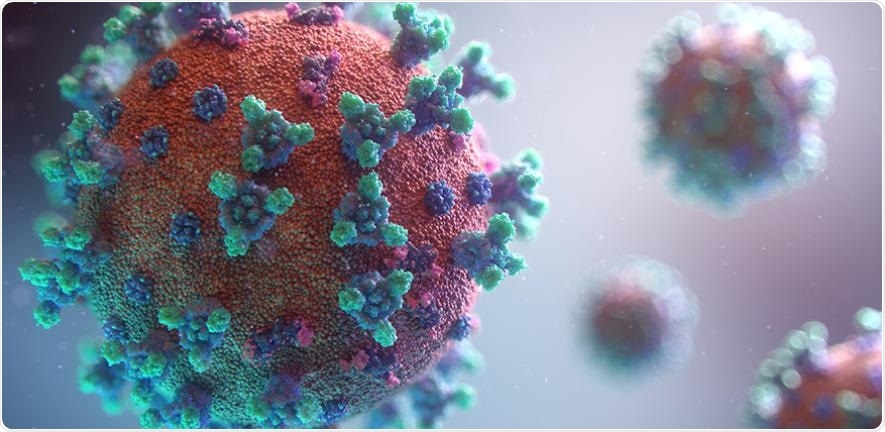According to a team of international scientists, the Delta variant of SARS-CoV-2, the dominant variant in countries including India and the United Kingdom, has likely spread through its capability to avoid neutralizing antibodies and its heightened infectivity.

Visualization of the Covid-19 virus. Image Credit: Fusion Medical Animation via Unsplash.
The observations were published on September 6th, 2021, in the journal Nature.
During replication of SARS-CoV-2, errors in the genetic makeup result in mutation. Certain mutations make the virus highly transmissible or highly infectious, while certain others help avoid the immune response, making vaccines less effective, while some have little effect.
The variant labeled B.1.617.2 Delta variant, first observed in India in late 2020, is one such variant. It has since spread globally—in the United Kingdom, it is the causative agent of most new cases of coronavirus infection.
By combining lab-based experiments and epidemiology of vaccine breakthrough infections, we’ve shown that the Delta variant is better at replicating and spreading than other commonly-observed variants. There’s also evidence that neutralizing antibodies produced as a result of previous infection or vaccination are less effective at stopping this variant.”
Ravi Gupta, Study Senior Author and Professor, Cambridge Institute of Therapeutic Immunology and Infectious Disease, University of Cambridge
Professor Gupta further adds, “These factors are likely to have contributed to the devastating epidemic wave in India during the first quarter of 2021, whereas many as half of the cases were individuals who had previously been infected with an earlier variant.”
To analyze how well the Delta variant evades the immune response, the researchers extracted serum from blood samples gathered as part of the COVID-19 cohort of the NIHR BioResource. The samples were from people who were earlier infected with the coronavirus or who were vaccinated with either the Pfizer or Oxford/AstraZeneca vaccines. Antibodies developed in response to vaccination or infection are present in the serum.
The researchers discovered that the Delta variant virus was 5.7-fold less sensitive to the sera from earlier-infected individuals and was around eight-fold less sensitive to vaccine sera when compared to the Alpha variant. Otherwise stated, it requires around eight times as many antibodies from a vaccinated individual to halt the virus.
Consistent with this, an examination of more than 100 infected healthcare workers at three Delhi hospitals, most of them vaccinated against SARS-CoV-2, identified that the Delta variant spread between vaccinated staff to a larger extent when compared to the alpha variant.
SARS-CoV-2 is a coronavirus, so-called as the spike proteins on its surface provides it the appearance of a crown (“corona”). The spike proteins attach to ACE2, a protein receptor present on the cell’s surface in the human body. Both the spike protein and ACE2 are later cleaved, permitting genetic material from the virus to enter the host cell. The virus influences the host cell’s machinery to allow the virus to replicate and spread.
Employing 3D airway organoids—the so-called “mini-organs” cultured from cells from the airway, which mirrors its behavior—the researchers examined the happenings when the virus approaches the respiratory tract. Investigating under secure conditions, the scientists employed both a live virus and a “pseudotyped virus”—a synthetic form of the virus that mirrors major mutations on the Delta variant—and utilized this to affect the organoids.
The researchers observed that the Delta variant was highly effective at entering into the cells when compared to other variants as it contained a greater number of cleaved spikes on its surface. After entering the cells, the variant was also better able to replicate. Both of these factors provided the virus a selection advantage over variants, helping elaborate why it has become so dominant.
The Delta variant has spread widely to become the dominant variants worldwide because it is faster to spread and better at infecting individuals than most other variants we’ve seen. It is also better at getting around existing immunity—either through previous exposure to the virus or to vaccination—though the risk of moderate to severe disease is reduced in such cases.”
Dr Partha Rakshit Study Joint Senior Author, National Centre for Disease Control, Delhi
According to Professor Anurag Agrawal from the CSIR Institute of Genomics and Integrative Biology, Delhi, India, “Infection of vaccinated healthcare workers with the Delta variant is a significant problem. Although they themselves may only experience mild COVID, they risk infecting individuals who have suboptimal immune responses to vaccination due to underlying health conditions—and these patients could then be at risk of severe disease.”
We urgently need to consider ways of boosting vaccine responses against variants among healthcare workers. It also suggests infection control measures will need to continue in the post-vaccine era.”
Anurag Agrawal, Professor and Study Joint Senior Author, CSIR Institute of Genomics and Integrative Biology
Source:
Journal reference:
Mlcochova, P., et al. (2021) SARS-CoV-2 B.1.617.2 Delta variant replication and immune evasion. Nature. doi.org/10.1038/s41586-021-03944-y.